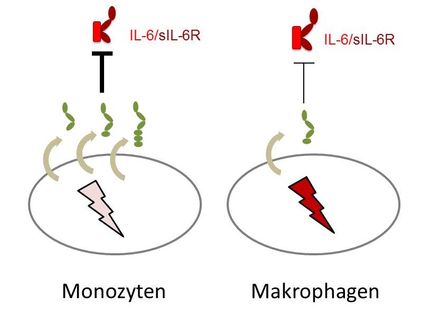Antibody research could lead to fine-tuned arthritis, cancer drugs
Advertisement
Drugs that target chronic inflammation - associated with everything from rheumatoid arthritis to cancer - without suppressing the entire immune system could be the payoff of new Cornell research on lab-created antibodies Researchers led by Moonsoo Jin, assistant professor of biomedical engineering, made antibodies that block only specific immune cells that cause inflammation, but not the ones the body normally uses to fight infections. The research was published in Proceedings of the National Academy of Sciences.
The key to the experiments are integrins, which are proteins expressed by the body's immune cells - in this case, cells called neutrophils - that allow the cells to travel to a cut, infection or other source of inflammation. Integrins are receptor molecules located on the cell surface that are like velcro that can be turned on and off. When they are chemically signaled to activate, they subtly change shape, called conformation, thereby exposing binding sites allowing them to firmly attach to receptors around them. This enables the neutrophils to stick to the inside of a blood vessel and invade into the surrounding tissue to a site of inflammation or infection.
"Integrins have these amazing, very dramatic conformational changes," said graduate student Sungkwon Kang.
The researchers' antibodies block a specific integrin called Mac-1, but only in its active state - that is, in its conformation that allows it to bind to and move through tissue. The new antibodies leave alone the cells with integrins in a resting state - those that are just waiting to be needed for an immune response. This would greatly cut down on the side effects associated with immunosuppressive drugs.
The researchers used a novel screening method that eventually isolated only these specific antibodies. They started by growing random mutations of Mac-1 integrins on the surfaces of yeast cells. They screened the yeast cells against a sample tissue that expresses receptors identical to those that Mac-1 integrins would normally bind to in the body. After an extensive washing of the remaining yeast cells, they exposed them, now expressing only active Mac-1 integrins, to fluorescently tagged antibodies to discern which antibodies bound to the remaining integrins. The strategy allowed quick, error-proof examination of antibody binding.
Therapies and treatments that could result from this research are numerous, said research associate and first author Xuebo Hu. Mac-1 activation is known to cause inflammation that can lead to some cancers, for example. Also, the antibodies could be fluorescently tagged to image, for example, inflammation or metastasized tumors.
Other news from the department science
Most read news
More news from our other portals
See the theme worlds for related content
Topic world Antibodies
Antibodies are specialized molecules of our immune system that can specifically recognize and neutralize pathogens or foreign substances. Antibody research in biotech and pharma has recognized this natural defense potential and is working intensively to make it therapeutically useful. From monoclonal antibodies used against cancer or autoimmune diseases to antibody-drug conjugates that specifically transport drugs to disease cells - the possibilities are enormous

Topic world Antibodies
Antibodies are specialized molecules of our immune system that can specifically recognize and neutralize pathogens or foreign substances. Antibody research in biotech and pharma has recognized this natural defense potential and is working intensively to make it therapeutically useful. From monoclonal antibodies used against cancer or autoimmune diseases to antibody-drug conjugates that specifically transport drugs to disease cells - the possibilities are enormous























































